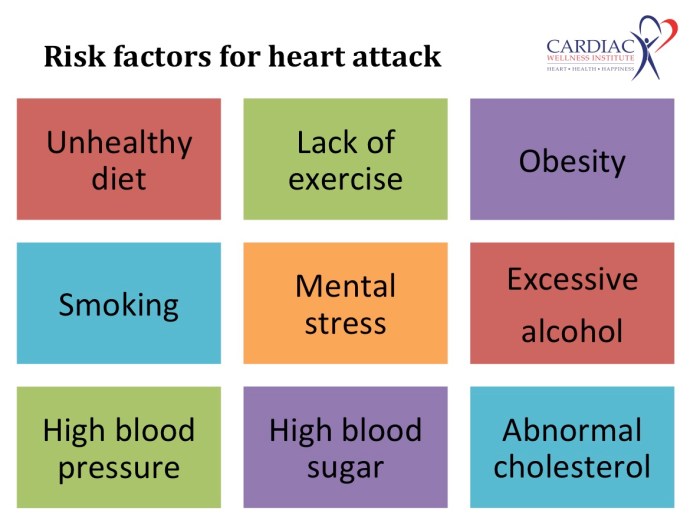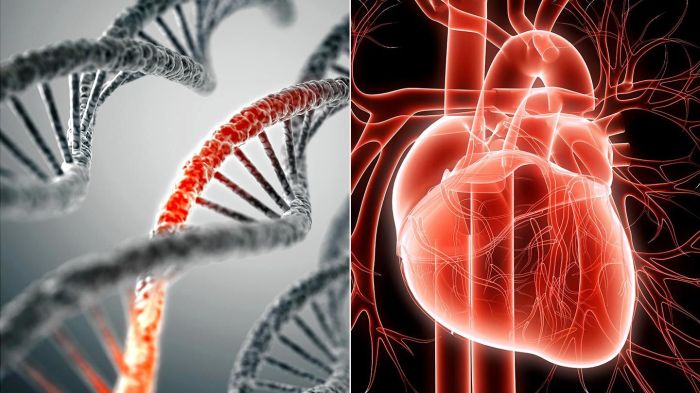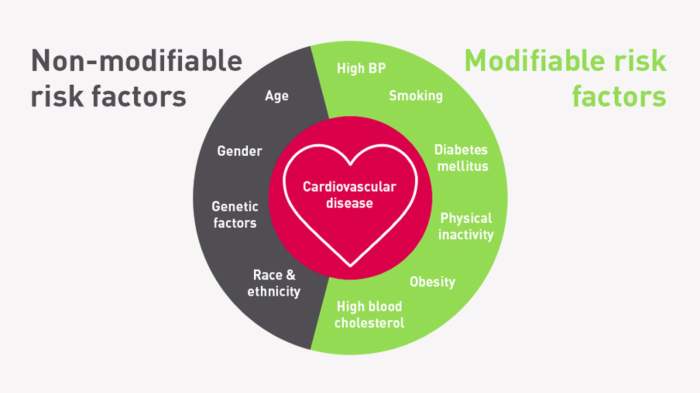Heart disease is a hereditary risk factor in Jamal’s family. This article will explore the role of genetics in the development of heart disease, the implications for Jamal, and the support and resources available to him.
Family history is a significant risk factor for heart disease. Individuals with a family history of the condition are more likely to develop it themselves. This is because certain genes can increase the risk of developing heart disease.
Heart Disease Risk Factors

Heart disease, also known as cardiovascular disease, is a major health concern worldwide. It is a group of conditions that affect the heart and blood vessels, including coronary artery disease, heart attack, stroke, and heart failure. Several risk factors contribute to the development of heart disease, including:
- Age
- Family history
- High blood pressure
- High cholesterol
- Diabetes
- Obesity
- Smoking
- Physical inactivity
- Unhealthy diet
Family history is a significant risk factor for heart disease. Individuals with a family history of the condition are more likely to develop it themselves. This is because certain genes can increase the risk of developing heart disease.
Genetics and Heart Disease

Genetics play a crucial role in the development of heart disease. Several genes have been identified that are associated with an increased risk of the condition. These genes are involved in various biological processes, including:
- Lipid metabolism
- Blood clotting
- Blood pressure regulation
- Inflammation
Mutations or variations in these genes can disrupt these processes, leading to the development of heart disease.
Hereditary Risk in Jamal’s Family
Jamal’s family has a history of heart disease. His father and grandfather both had heart attacks at a relatively young age. This suggests that Jamal may have inherited a genetic predisposition to the condition.
The likelihood of Jamal inheriting the condition depends on the specific genes involved and the pattern of inheritance. In some cases, heart disease can be inherited in a Mendelian fashion, where a single gene mutation is responsible for the condition.
In other cases, it can be inherited in a more complex manner, involving multiple genes and environmental factors.
Implications for Jamal: Heart Disease Is A Hereditary Risk Factor In Jamal’s Family

The hereditary risk of heart disease in Jamal’s family has several potential health implications for him. He is at an increased risk of developing heart disease at a younger age than individuals without a family history.
To reduce his risk, Jamal should make lifestyle modifications and consider medical interventions. Lifestyle modifications include:
- Maintaining a healthy weight
- Eating a healthy diet
- Getting regular exercise
- Quitting smoking
- Managing stress
Medical interventions may include:
- Medications to lower blood pressure and cholesterol
- Aspirin therapy to prevent blood clots
- Surgery or angioplasty to improve blood flow to the heart
Genetic Testing

Genetic testing can be used to assess the risk of heart disease in individuals with a family history of the condition. Genetic testing can identify mutations or variations in genes that are associated with an increased risk of heart disease.
The results of genetic testing can help individuals make informed decisions about their health. They can identify individuals who are at high risk and need to take preventive measures. Genetic testing can also help guide treatment decisions and identify individuals who may benefit from specific medications or interventions.
Support and Resources
Individuals at risk of heart disease can benefit from support and resources to help them manage their condition. Support groups can provide emotional support and information about heart disease. Health care professionals can provide medical advice and guidance on lifestyle modifications and medical interventions.
It is important for individuals at risk of heart disease to seek professional advice and support. Early detection and intervention can help reduce the risk of developing heart disease and improve overall health outcomes.
FAQ Compilation
What are the symptoms of heart disease?
The symptoms of heart disease can vary depending on the type of heart disease. Some common symptoms include chest pain, shortness of breath, fatigue, and swelling in the legs.
How is heart disease treated?
The treatment for heart disease depends on the type and severity of the condition. Treatment may include lifestyle modifications, medications, and surgery.
What are the risk factors for heart disease?
There are many risk factors for heart disease, including high blood pressure, high cholesterol, diabetes, obesity, and smoking.